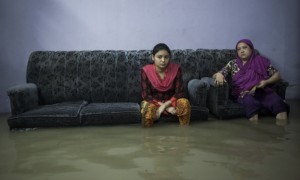A court in Burma/Myanmar has found two Muslim women guilty of sparking sectarian violence; both are sentenced to two years in prison with hard labor. One of the women bumped into a monk earlier this year, which resulted in Buddhist monks raiding shops and homes in the region.
Many Tajik marriages are arranged, but the country now has its first professional matchmaking services too; most of the clientele are divorced men and women.
According to the British government about 20,000 girls in the UK could be at risk of Female Genital Mutilation (FGM); a hotline has now been launched to help to protect girls of this abuse.
Fatimata Oumarr is a Tuareg singer from Mali, who has fled the violence as so many others, and now as a refugee uses her work and talents as a means of resistance.

Qantara.de interviews Tunisian intellectual Amel Grami on the current situation of women in Tunisia.
Local activists have noticed a change in the kind of Female Genital Mutilation (FGM) practiced in Somalia, and they hope that this will bring the country closer to completely eradicating the practice.
The hijab is an increasingly common sight now in the African nation of Malawi.
In the Osh-region of Kyrgyzstan, inter-ethnic marriages are now more common and are perhaps a sign of a more tolerant society, despite the fairly recent violent clashes between the communities in 2010.
An attack on the campus of an all-female university in Quetta, Pakistan has killed 14 young women.
The use of contraception in Yemen is in most areas not yet socially accepted and subject of much speculation and myths; the fast population growth and the dismal Yemeni economy, however, make that most children born now will grow up in poverty.
The Indonesian police force is contemplating to revise the hijab ban for female officers.
For many women in Gaza, online media and platforms are the best (and often only) way to raise their voices, as there is no real censorship on social media.
Senegalese women can now transfer the Senegalese nationality to husband and children; the bill was voted for “unanimously without debate”.
Zainab al-Khawaja, Bahraini activist, has been given another jail term for two months for insulting police. Her official jail term will now end in February 2014.
Nadjoua and Linda Bansil, two female filmmakers whose work highlights Filipino Muslim culture, have been abducted on the island of Sulu by the Abu Sayyaf group.
A Muslim girl in Ahmedabad, India has been sent home by her school for wearing a “burqa” in class; the girl insists that what she was wearing was just a headscarf/hijab.
Many gas stations in China’s Xinjiang province are displaying notices that say that they are denying service to women who are wearing a headscarf. Similar notices can also be found in other businesses, government organizations etc. in the region.
Sabahi Online features the stories of the women and girls, who were forced to marry al-Shabaab fighters, when al-Shabaab controlled much of Somalia.
Sydney, Australia, is home to an all-female, predominantly Muslim rugby team.
Sudan Vision features an article on scars and the traditional image of beauty in the many different Sudanese communities.
Rym Amari is the first Miss Algeria in 10 years.












